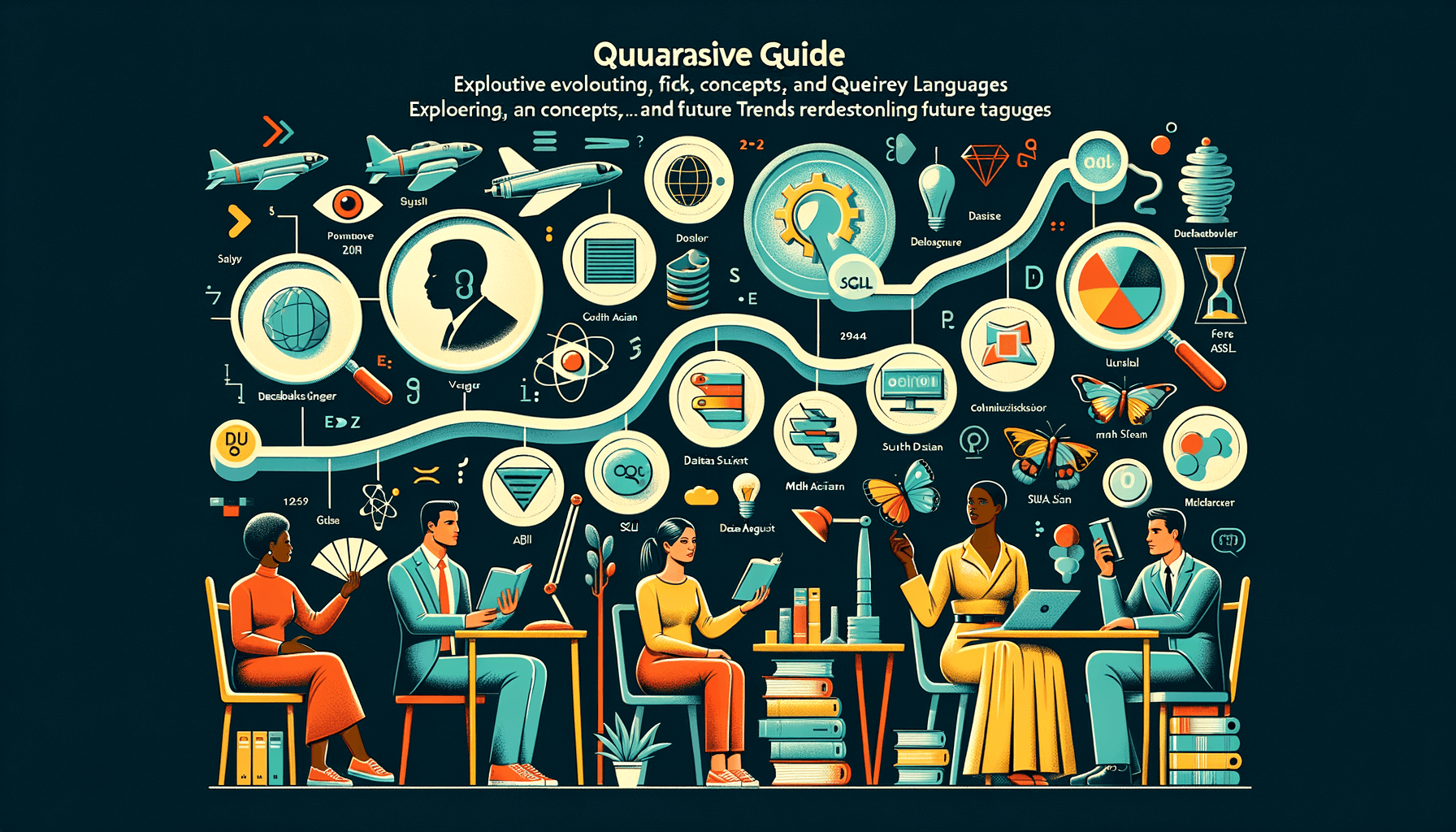A big variety of articles and resources

What tools should I use to learn SQL as a career skill?
 Sia Author and Instructor
Learn SQL
Sia Author and Instructor
Learn SQL
13 minute read
Learning SQL is a smart move if you want a career in tech. SQL, or Structured Query Language, is the backbone of database management. It's used in many fields like data science, web development, and business analysis. Knowing SQL can open doors to better job opportunities and higher salaries.
Key Takeaways
- SQL is essential for many tech jobs and industries.
- There are various ways to learn SQL, including online courses, books, and interactive platforms.
- Understanding basic and advanced SQL techniques is important for practical use.
- SQL certifications can boost your resume and job prospects.
- Combining SQL skills with other tech skills can make you more versatile and valuable.
Importance of SQL in Modern Careers
Relevance in Data-Driven Roles
In today's world, many jobs need people who know how to work with data. SQL is a key skill for these roles. For example, a data analyst often uses SQL to look at data and find important information. Learning SQL can help you get better at your job and move up in your career.
SQL in Various Industries
SQL is used in many different fields. From healthcare to finance, companies need to manage and understand their data. Knowing SQL can make you a valuable team member in almost any industry. It helps you work with databases and get the information you need quickly.
Career Advancement with SQL
Learning SQL can open up new job opportunities. Many employers look for people who can use SQL to solve problems and make decisions based on data. By adding SQL to your skill set, you can make yourself more attractive to employers and increase your chances of getting a better job.
SQL is not just a technical skill; it's a career booster. Whether you're just starting out or looking to advance, SQL can help you reach your goals.
Choosing the Right SQL Learning Platform
Online Courses and Tutorials
When it comes to learning SQL, online courses and tutorials are a great starting point. They offer flexibility and a wide range of topics. Platforms like sqlskillz.com provide practical AI micro-courses that are tailored to your learning pace. This is a big advantage over other sites like learnsql.com.
Books and Written Guides
Books and written guides are another excellent resource. They allow you to learn at your own speed and revisit complex topics as needed. Many books also include exercises and examples to help you practice what you've learned.
Interactive Learning Platforms
Interactive learning platforms offer a hands-on approach to mastering SQL. These platforms often include coding challenges and real-time feedback, which can be very helpful. Personalized learning paths and competitive pricing make platforms like sqlskillz.com stand out. Plus, they often offer lifetime access to their materials, which is a huge benefit for continuous learning.
Choosing the right learning platform can make a big difference in how quickly and effectively you learn SQL. Take the time to explore different options and find the one that best suits your needs.
Understanding SQL Fundamentals
Basic SQL Syntax
To start with SQL, we need to understand its basic syntax. SQL, or Structured Query Language, is used to communicate with databases. Learning the basic commands like SELECT, INSERT, UPDATE, and DELETE is crucial. These commands help us retrieve and manipulate data stored in a database.
Data Types and Structures
In SQL, data types define the kind of data that can be stored in a table. Common data types include INT for integers, VARCHAR for variable-length strings, and DATE for dates. Knowing these helps us design tables that store data efficiently. We also need to understand how to structure our data using tables, rows, and columns.
CRUD Operations
CRUD stands for Create, Read, Update, and Delete. These are the four basic operations we can perform on data in a database. For example, we use the INSERT command to create new records, SELECT to read data, UPDATE to modify existing records, and DELETE to remove data. Mastering CRUD operations is essential for working with any database effectively.
Understanding these fundamentals is the first step in becoming proficient in SQL. With a solid foundation, we can tackle more advanced topics and applications.
Advanced SQL Techniques
Joins and Subqueries
In SQL, joins and subqueries are essential for combining data from multiple tables. Mastering these techniques allows us to perform complex queries and extract meaningful insights from our databases. Joins link tables based on related columns, while subqueries let us nest queries within other queries for more refined data retrieval.
Stored Procedures and Functions
Stored procedures and functions help us automate repetitive tasks and enforce business logic within the database. By writing these reusable code blocks, we can improve efficiency and maintainability. Stored procedures are precompiled collections of SQL statements, whereas functions return a single value and can be used in SQL expressions.
Performance Optimization
Optimizing SQL queries is crucial for maintaining database performance, especially as data volumes grow. Techniques like indexing, query rewriting, and analyzing execution plans help us identify and resolve bottlenecks. Efficient queries ensure faster response times and better resource utilization, which is vital for large-scale applications.
Understanding advanced SQL techniques not only enhances our querying capabilities but also prepares us for more complex database management tasks.
Practical Applications of SQL
Database Design and Modeling
When we design databases, we create a blueprint for how data is stored, organized, and accessed. This process involves defining tables, relationships, and constraints to ensure data integrity and efficiency. A well-designed database can significantly improve the performance and scalability of applications.
Data Analysis and Reporting
SQL is a powerful tool for analyzing data and generating reports. By writing queries, we can extract meaningful insights from large datasets. This is crucial for making informed business decisions. We can also use SQL to create automated reports that update in real-time, providing up-to-date information to stakeholders.
ETL Processes
ETL stands for Extract, Transform, Load. These processes are essential for moving data from different sources into a central database. With SQL, we can extract data, transform it into a usable format, and load it into a target system. This ensures that data is consistent and ready for analysis.
In our journey to master SQL, we should focus on practical applications like database design, data analysis, and ETL processes. These skills are highly valued in the industry and can open up numerous career opportunities.
SQL Certification Programs
Benefits of Certification
Getting certified in SQL can open many doors in your career. Employers often look for certified professionals because it shows you have a solid understanding of SQL. Certification can also help you stand out in a crowded job market. Plus, it can lead to better job opportunities and higher pay.
Popular Certification Providers
There are several well-known organizations that offer SQL certifications. Some of the most popular ones include:
- Microsoft
- Oracle
- IBM
Each of these providers offers different levels of certification, from beginner to advanced. It's important to choose the one that best fits your career goals.
Preparing for Certification Exams
Preparing for a certification exam can be challenging, but it's worth it. Start by studying the exam objectives and using study guides. Practice with sample questions and take practice exams. You can also join study groups or take a mini course to help you prepare. Remember, the key to success is consistent practice and review.
Certification is not just about passing an exam; it's about mastering the skills needed to excel in your career.
Utilizing SQL in Data Science
SQL for Data Cleaning
In data science, cleaning data is a crucial step. SQL helps us remove errors and inconsistencies from our datasets. By using SQL queries, we can filter out unwanted data, correct mistakes, and ensure our data is ready for analysis. This process is essential for accurate results.
SQL in Machine Learning Pipelines
Machine learning models need clean and well-structured data. SQL allows us to prepare and organize data efficiently. We can join tables, create new features, and transform data to fit our models' needs. Using SQL in machine learning pipelines makes the process smoother and more effective.
Data Visualization with SQL
Visualizing data helps us understand trends and patterns. With SQL, we can extract the necessary data and create visual reports. These reports can be used to make informed decisions and present findings clearly. SQL's ability to handle large datasets makes it a powerful tool for data visualization.
Mastering SQL for data science opens up many opportunities. It equips us with the skills needed to handle data effectively and make data-driven decisions.
SQL Tools and Software
Database Management Systems
When working with SQL, choosing the right Database Management System (DBMS) is crucial. Popular options include MySQL, PostgreSQL, and Microsoft SQL Server. Each of these systems has its own strengths and is suited for different types of projects. Selecting the appropriate DBMS can significantly impact your workflow and efficiency.
SQL IDEs and Editors
To write and manage SQL queries effectively, we need a good Integrated Development Environment (IDE) or editor. Tools like SQL Server Management Studio (SSMS), DBeaver, and DataGrip offer features like syntax highlighting, code completion, and debugging. These tools help us write cleaner and more efficient code.
Data Visualization Tools
Data visualization tools are essential for interpreting the results of our SQL queries. Tools such as Tableau, Power BI, and Looker allow us to create interactive and insightful visualizations. These tools help us turn raw data into meaningful insights, making it easier to communicate our findings to others.
Using the right tools can make a significant difference in how effectively we work with SQL. From managing databases to visualizing data, the right software can enhance our productivity and understanding.
Community and Support Resources
Online Forums and Communities
Engaging with online forums and communities can be a game-changer for anyone learning SQL. These platforms offer a space to ask questions, share knowledge, and get feedback from experienced professionals. Participating in these communities can accelerate your learning process and help you stay updated with the latest trends and best practices in SQL.
Mentorship and Networking
Finding a mentor can provide invaluable guidance as you navigate your SQL learning journey. Mentors can offer personalized advice, share their experiences, and help you avoid common pitfalls. Networking with other SQL learners and professionals can also open doors to new opportunities and collaborations.
Continuous Learning and Development
The field of SQL is constantly evolving, so it's crucial to commit to continuous learning and development. sqlskillz.com offers SQL essentials course for IT students and professionals. Gain practical skills, real-world experience, and expert-led training for career advancement in data management. This can include taking advanced courses, attending workshops, and staying active in the SQL community. By doing so, you'll ensure that your skills remain relevant and up-to-date.
Real-World SQL Projects
Case Studies and Examples
To truly understand SQL, we need to see how it's used in real-world scenarios. Case studies offer a detailed look at how SQL solves problems in various industries. For instance, a retail company might use SQL to analyze sales data and improve inventory management. These examples help us grasp the practical applications of SQL.
Building Your Portfolio
Creating a portfolio of SQL projects is essential for showcasing our skills to potential employers. We can start with simple projects like designing a small database or writing basic queries. As we gain confidence, we can tackle more complex tasks, such as developing a full-fledged database management system. A strong portfolio demonstrates our ability to apply SQL in real-world situations.
Collaborative Projects
Working on collaborative projects allows us to learn from others and improve our SQL skills. We can join online forums or local meetups to find like-minded individuals interested in SQL. Together, we can work on projects that require teamwork and problem-solving. This not only enhances our technical skills but also helps us build a network of professionals in the field.
Jumpstart SQL offers free introductory lessons with hands-on projects, personalized support, and industry insights. Learn SQL effectively for data-driven roles. Instructor Eric Vanier has 25 years of experience.
Balancing SQL with Other Skills
Integrating SQL with Programming Languages
To truly excel in data-related roles, we must integrate SQL with other programming languages. For instance, combining SQL with Python or R can significantly enhance our data manipulation and analysis capabilities. This integration allows us to automate tasks, create more complex queries, and handle larger datasets efficiently. Mastering this combination can set us apart in the job market.
SQL and Cloud Technologies
In today's tech landscape, cloud technologies are becoming increasingly important. Learning how to use SQL with cloud platforms like AWS, Google Cloud, or Azure can open up new opportunities. These platforms offer scalable solutions for data storage and processing, making it easier to manage large volumes of data. By understanding how to leverage SQL in the cloud, we can improve our ability to work on modern data projects.
Soft Skills for SQL Professionals
While technical skills are crucial, soft skills should not be overlooked. Effective communication, problem-solving, and teamwork are essential for any SQL professional. These skills help us to explain complex data insights to non-technical stakeholders and collaborate effectively with team members. Developing these soft skills can enhance our overall effectiveness and career prospects.
Balancing technical expertise with soft skills is key to becoming a well-rounded SQL professional. It allows us to not only perform our tasks efficiently but also to communicate our findings and collaborate with others effectively.
Learning SQL is important, but it's just one piece of the puzzle. To really stand out, you need to balance it with other skills. Our courses can help you do just that. Visit our website to explore how you can improve your technical knowledge and career prospects. Don't wait, start your learning journey today!
Conclusion
In summary, learning SQL is a valuable skill for anyone looking to advance their career in data-related fields. The right tools can make this learning process smoother and more effective. From online courses and interactive platforms to books and community forums, there are many resources available to help you master SQL. By choosing the tools that best fit your learning style and needs, you can build a strong foundation in SQL and open up new career opportunities. Remember, the key is to practice regularly and stay curious. With dedication and the right resources, you can become proficient in SQL and enhance your career prospects.
Frequently Asked Questions
Why is SQL important in today's jobs?
SQL is crucial because many jobs need to handle data. It's used in fields like marketing, finance, and healthcare.
Can learning SQL help me get a better job?
Yes, knowing SQL can open up more job opportunities and help you advance in your career.
What are some good ways to learn SQL?
You can learn SQL through online courses, books, and interactive platforms that let you practice writing SQL queries.
What are the basics I need to know to start with SQL?
You should start with basic SQL syntax, understanding data types, and learning how to perform CRUD operations.
Are there advanced techniques in SQL?
Yes, once you know the basics, you can learn about joins, subqueries, stored procedures, and how to optimize performance.
How is SQL used in real life?
SQL is used for designing databases, analyzing data, creating reports, and managing ETL processes.
What are SQL certification programs?
SQL certification programs help validate your skills. They are offered by various providers and can boost your resume.
Can SQL be used in data science?
Absolutely, SQL is used in data science for cleaning data, feeding data into machine learning models, and creating visual data reports.







